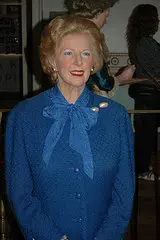The Iron Lady, Dementia and Caregiving
 I watched this movie expecting to learn more about British Prime Minister Margaret Thatcher’s life story, with the emphasis on her place in British history and politics. I knew she must have been a unique person to have achieved the position of Britain’s only female Prime Minister to date. What I didn’t know I would see was the intimate portrayal by Meryl Streep of Thatcher as an elderly woman living with early memory loss. The depiction of that part of her life story is more important and touching than what we read about in history books and newspapers.
I watched this movie expecting to learn more about British Prime Minister Margaret Thatcher’s life story, with the emphasis on her place in British history and politics. I knew she must have been a unique person to have achieved the position of Britain’s only female Prime Minister to date. What I didn’t know I would see was the intimate portrayal by Meryl Streep of Thatcher as an elderly woman living with early memory loss. The depiction of that part of her life story is more important and touching than what we read about in history books and newspapers.
While we can’t actually know what dementia is like unless we also have memory loss, I believe Meryl Streep’s portrayal of the disease must be close to accurate. It shows dementia from the point of view of the patient, from the inside looking out. We feel Thatcher’s sense of confusion as she drifts from her present reality to memories throughout her life, including happy times with her husband, Denis, and their two children.
I believe dementia patients live with a huge amount of fear. Imagine if your everyday surroundings were no more — if your familiar home came and went from day to day, or hour to hour? If you had no sense of Security in your environment? If you no longer could recognize those people that are with you every day?! We feel her fear, which manifests itself in paranoia as she “spies” on her household staff that seem to be talking about her when she’s not in the room.
We understand Thatcher’s loneliness through the flashbacks with her husband and children. The deep loss she lives with after the death of her husband, Denis, is shown as she carries on imaginary conversations with him repeatedly. And the reluctance but resolve to accomplish the challenging feat of going through her late husband’s belongings is portrayed realistically. Doing that task has got to be incredibly difficult, emotionally and physically, especially for an older person who was deeply in love with their spouse.
Thatcher hallucinates a lot in this movie. While that is a possible symptom of dementia, I think the frequency of them in the movie is partially the director’s way of story narration. The conversations and vignettes with Denis add depth to the story, and seem to be a combination of hallucinations and memories.
I was touched by how Streep shows the “Iron Lady” is also a frail elderly woman. There is one scene that also demonstrates how many senior citizens are “invisible” to society. Thatcher manages to slip out alone from her home to go to the grocery store, and no one recognizes her as the powerful Prime Minister she once was — she is simply an “old woman” buying milk. She could be anyone’s grandmother as she is jostled slightly while waiting her turn to pay, and then walking carefully outside on the street back to her home.
Other aspects of the film are how her children treat the Aging Prime Minister and the depiction of a family caregiver. Thatcher’s son, Mark, lives in South Africa with his family during the time of the movie and is not present in the movie except by phone and in flashbacks. Her daughter, Carol, takes on the role as her primary caregiver. Carol helps her mother with day-to-day activities, coordinates care with Thatcher’s house staff, takes her to her doctor’s appointments, protects her frailty and dignity, and is clearly worried about her mental decline. While we sense Carol’s frustration as she has to take on the parental role, for the most part, she doesn’t let her mother see the angst she feels. She is a good overall role model for other Caregiving adult children. One sibling acting as primary caregiver is often the norm these days with families living spread out throughout the globe.
_____________________________________________
Photo Credit: Axel Schwenke’s photostream






















